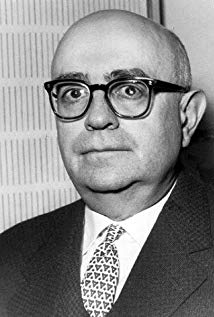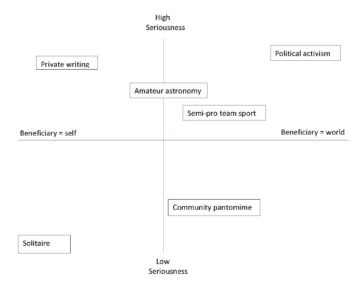by Emrys Westacott
 The philosopher Theodore Adorno, probably with activities such as reading serious literature and listening to classical music in mind, famously said about himself:
The philosopher Theodore Adorno, probably with activities such as reading serious literature and listening to classical music in mind, famously said about himself:
I have no hobby. Not that I am the kind of workaholic who is incapable of doing anything with his free time but applying himself industriously to the required task. But as far as my activities beyond the bounds of my recognized profession are concerned, I take them all, without exception, very seriously.
Adorno in fact describes hobbies as preoccupations that one has “become mindlessly infatuated with in order to kill time.” Many people who engage in some pursuit avidly yet non-professionally might not share Adorno’s condescending attitude towards hobbies, but they often view what they do with something like the same seriousness. Hence they are more likely to describe themselves as “amateur” rather than “recreational” astronomers, geologists, ornithologists, musicians, arists, runners, swimmers, etc.. Mere recreations aim at little more than enjoyment. The very word suggests that the activity is not too demanding and the attitude towards it is fairly relaxed. But the serious amateur seeks or hopes for something more: to win prizes, gain glory, make a contribution to some field, or at least achieve a significant level of accomplishment.
A simple chart allows one to plot how various activities might be thought to measure up according to criteria of the seriousness and scope.

Regarding recreations and hobbies, we should distinguish between subjective and objective notions of seriousness or importance. It is possible for someone to take something very seriously in the sense that it consumes them–it is an activity in which they can participate in with great alacrity, and they are temporarily uplifted or downcast by the outcome–and yet for them to acknowledge that, in the great scheme of things, it really isn’t very important. This is how many people relate to sports, whether as participants or as spectators; and the same could be said for most competitive enterprises, from spelling bees to dog shows. Indeed, it is part of the pleasure of games that one can throw oneself into them à corps perdu, experiencing intense forms of desiring and willing while the consequences are generally kept within the relatively safe confines of an artificial arena.
Sometimes, of course, the walls isolating the game from life break down. Sport can be the continuation of war or politics by other means; soccer fans go on a drunken rampage; an Olympian ice skater has a rival hobbled with an iron bar to the knee; five years on and you still haven’t forgiven me for cheating at Scrabble. For the most part, though, the walls hold up. It is mainly young children who have trouble recognizing where they are, which is why they have they often have to be reminded that something “is only a game.” Adults taking hobbies too seriously can be a pathetic spectacle, but it is also a staple of comedy. P. G. Wodehouse’ stories, for instance, often feature an avid hobbyist–say, a collector of cow creamers, or a prize pig breeder–behaving as if something truly important is at stake, likely to occasion high crimes and misdemeanors.
A common form of disagreement concerns exactly where on the chart an activity should be located. You may consider your efforts as an artist or a poet or a musician to be terribly important. This activity is your true calling. In your eyes, it constitutes an important part of your identity, has the potential to have a significant impact on the world, and is an important source of self-respect. You hope, expect, and even demand that other people view it in the same way. But they don’t. They just see your sketching, scribbling, or strumming as a harmless hobby that occasionally produces pleasing results.
Moreover, the respect your leisure activity receives from others is not determined simply by how adept you are at it. Some activities enjoy greater kudos because they involve higher levels of artistry, skill, strength, or daring. Compare rock climbing to trainspotting. Somehow, “I scaled the Matterhorn” is more impressive than “I saw the EGM 2815 on Saturday in Nottingham.”
The connection between an activity and wider community concerns is also important. Your stamp collection may be impressive, but it has little significance for anyone beyond yourself. By contrast, participation in, say, a youth outdoor activities organization, a football supporters club, or an amateur theater, contributes to something that is valued by many others. The chief underlying purpose of sport or theater may be recreation and entertainment. But when community interests and identities become attached to them, they acquire a much greater significance. Thus, the decline of a once proud soccer team or the closing of a theater can come to be viewed as a regional tragedy. And people who voluntarily devote themselves to maintaining or improving such institutions are likely to receive appropriate social respect.
Adorno’s stern opinion that leisure should be used for more than mere amusement is directed against what he sees as a dominant trend in modern culture towards a shallow hedonism. One can, and some will, dismiss it as mere intellectual snobbery. But it opens up a profound question first posed by Aristotle when discussing the nature of the good life for human beings:
- Our problem, therefore, is to find modes of activity which will fill our leisure. We can hardly fill our leisure with pleasure. To do so would make play the be-all and end-all of life.
 Writing over two thousand years ago, Aristotle took it for granted this would only ever be a problem for a small minority. For slaves, he says, there is no leisure; and the same holds for the vast majority who have to spend most of their time securing a livelihood. Today, though, the astonishing expansion of productive power and labour-saving technology over the past two centuries means that Aristotle’s question–how should we fill our leisure?¬–has become increasingly relevant to large numbers of people. Moreover, there are reasons to hope that this number will continue to grow.
Writing over two thousand years ago, Aristotle took it for granted this would only ever be a problem for a small minority. For slaves, he says, there is no leisure; and the same holds for the vast majority who have to spend most of their time securing a livelihood. Today, though, the astonishing expansion of productive power and labour-saving technology over the past two centuries means that Aristotle’s question–how should we fill our leisure?¬–has become increasingly relevant to large numbers of people. Moreover, there are reasons to hope that this number will continue to grow.
For Aristotle, the true purpose of leisure is not mere pleasure but self-realization. And for him this means, above all, cultivating the intellectual and moral faculties that are essential to our humanity and differentiate us from the rest of nature. We do this through activities such as the pursuit of knowledge, non-trivial conversation with the right sort of friends, civic engagement, the appreciation of fine music and poetry, and of course (especially and predictably!) through philosophy. Aristotle’s intellectualist bias, like Adorno’s snobbery, is open to criticism. Nevertheless, the underlying assumption the two thinkers share–that even when freed from the shackles of labour a genuinely fulfilling life must go beyond just relaxation and recreation–is worth taking seriously.
